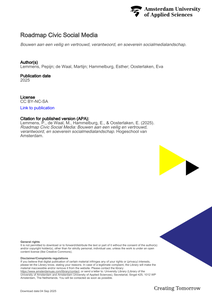Ons huidige socialmediagebruik brengt een aantal grote risico’s met zich mee voor de samenleving. Sociale fragmentatie, polarisatie en de verspreiding van misinformatie zijn schadelijk voor de democratie en onze maatschappelijke weerbaarheid. De verslavende werking van sociale media kan ten koste gaan van ons welzijn. De afhankelijkheid van grote buitenlandse techbedrijven, die winst voor aandeelhouders belangrijker vinden dan het borgen van publieke waarden, ondermijnen onze digitale soevereiniteit en zeggenschap over belangrijke communicatiekanalen.
MULTIFILE

De opkomst van civic crowdfunding biedt mogelijkheden voor gemeentelijke overheden die burgerinitiatieven willen stimuleren. Maar slaat civic crowdfunding vooral aan bij een beperkte groep relatief hoogopgeleide burgers? De Hogeschool van Amsterdam onderzoekt dit.
LINK
The Middle East and North Africa region has been absent form stocktaking exercises on social accountability initiatives (SAI), an umbrella term to designate citizen-led tools aimed at socio-political change. We argue that this sidelining is unwarranted, given the proliferation of participatory governance initiatives, civic associations and popular mobilisation in Arab societies after 2011. Whereas the struggle for improved accountability in the Arab world remains under-researched, analysis of authoritarian regime tactics has proliferated. The fact is, however, that many Arab societies have experimented with mechanisms to apply political pressure on corrupt elites while international donors have launched diverse SAIs, including community score cards and participatory and gender-responsive budgeting initiatives. In this chapter, we first identify this double gap: not only has the literature on SAIs overlooked the MENA region but scholarship on the Middle East has largely failed to recognise initiatives launched across the region over the past decade as SAIs. Then, we aim to address the blind spot of Arab SAI’s as pathways towards improved governance. Finally, we present an overview of extant literature and introduce a set of four research questions to better understand what social accountability means for people on the ground. These questions focus on the various meanings of social accountability (musā’ala vs muhāsaba), its modes of mobilisation, the responses from authorities to such initiatives and their overall outcomes.
MULTIFILE
This project develops a European network for transdisciplinary innovation in artistic engagement as a catalyst for societal transformation, focusing on immersive art. It responds to the professionals in the field’s call for research into immersive art’s unique capacity to ‘move’ people through its multisensory, technosocial qualities towards collective change. The project brings together experts leading state-of-the-art research and practice in related fields with an aim to develop trajectories for artistic, methodological, and conceptual innovation for societal transformation. The nascent field of immersive art, including its potential impact on society, has been identified as a priority research area on all local-to-EU levels, but often suffers from the common (mis)perception as being technological spectacle prioritising entertainment values. Many practitioners create immersive art to enable novel forms of creative engagement to address societal issues and enact change, but have difficulty gaining recognition and support for this endeavour. A critical challenge is the lack of knowledge about how their predominantly sensuous and aesthetic experience actually lead to collective change, which remains unrecognised in the current systems of impact evaluation predicated on quantitative analysis. Recent psychological insights on awe as a profoundly transformative emotion signals a possibility to address this challenge, offering a new way to make sense of the transformational effect of directly interacting with such affective qualities of immersive art. In parallel, there is a renewed interest in the practice of cultural mediation, which brings together different stakeholders to facilitate negotiation towards collective change in diverse domains of civic life, often through creative engagements. Our project forms strategic grounds for transdisciplinary research at the intersection between these two developments. We bring together experts in immersive art, psychology, cultural mediation, digital humanities, and design across Europe to explore: How can awe-experiences be enacted in immersive art and be extended towards societal transformation?